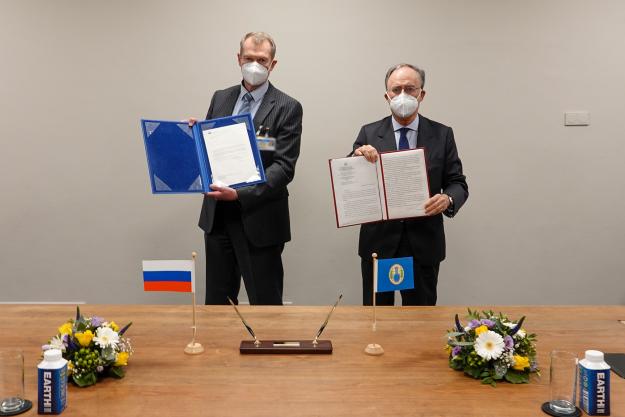The Russian Federation has contributed €70,000 to the Trust Fund of the Scientific Advisory Board of the Organisation for the Prohibition of Chemical Weapons (OPCW) in support of its ongoing work to provide independent advice to the Organisation on developments in science and technology of relevance to the Chemical Weapons Convention.
The contributions were formalised on 1 December during a ceremony between the Permanent Representative of the Russian Federation to the OPCW, H.E. Ambassador Alexander Shulgin, and the OPCW Director-General, H.E. Mr Fernando Arias, in presence of Dr Viktor Kholstov, member of the Scientific Advisory Board.
Ambassador Shulgin stated: "The Russian Federation attaches great importance to the work of the Scientific Advisory Board of the OPCW. The role of the SAB in monitoring science and technology of relevance to the Chemical Weapons Convention greatly assists the OPCW in identifying possible threats and challenges to the object and purpose of the Convention. Our contribution is a vivid example of Russia's readiness to support any activities to strengthen the OPCW in strict compliance with the provisions of the Convention."
The Director-General expressed: "I am grateful to the Russian Federation for its contribution to the Trust Fund of the Scientific Advisory Board. The Board's ongoing work in monitoring developments in science and technology of relevance to the Convention is critical to the ongoing success of the Organisation. This contribution will help support the activities of the Scientific Advisory Board for which no funding is allocated in the Programme and Budget, such as the work of the Board's temporary working groups and the convening of topical workshops."

Background
The Scientific Advisory Board (SAB), composed of 25 independent experts from OPCW Member States, advises the Director-General on science and technology issues relevant to the implementation of the Chemical Weapons Convention. Every five years, the SAB also prepares a larger report on developments in science and technology for submission to Review Conferences of the Convention.
In January 2021, the SAB established a temporary working group (TWG) on the analysis of biotoxins to undertake an in-depth review of the methods and technologies used in the analysis of biotoxins and provide expert advice on the questions set out in the terms of reference of the Group. The TWG's mandate was set for two years with a possibility of extension, pending the needs of the Organisation and available funding.
As the implementing body for the Chemical Weapons Convention, the OPCW, with its 193 Member States, oversees the global endeavour to permanently eliminate chemical weapons. Since the Convention's entry into force in 1997, it is the most successful disarmament treaty eliminating an entire class of weapons of mass destruction.
Over 98% of all declared chemical weapon stockpiles have been destroyed under OPCW verification. For its extensive efforts in eliminating chemical weapons, the OPCW received the 2013 Nobel Peace Prize.






